This article is part of our Qingming Festival Family Guide. Sign up for our newsletter to receive our best activity, recipe and craft ideas before every Chinese holiday.
Burning joss paper is a traditional Chinese-Taoist practice that sends money and materials goods to deceased relatives in the afterlife. It’s common to burn joss paper at funerals, on ancestor birthdays and during important holidays like the Qingming Festival and the Hungry Ghost Festival.
Arguably the most famous place to buy joss paper is in Hong Kong, where there’s an entire district in Sheung Wan dedicated to these types of goods. American Chinatowns have had dedicated joss paper stores since the first immigrants arrived in this country.
Joss paper customs are rich with symbolism and family history, the type of tradition you can imagine being shared in Chinese from grandmothers to their grandchildren. Consequently, adopting joss paper customs here in the United States without a direct cultural connection can be intimidating. Settle in — this comprehensive guide is here to help.
What is Joss Paper?
Collectively, joss paper offerings are physical representations of money and daily necessities like clothing, personal electronics and household goods. The basic notion behind burning joss paper is that an offering is conveyed into the spirit world through the fire’s smoke.
The most traditional type of “everyday” joss paper is made from sheets of coarse bamboo paper, each decorated with a square of gold or silver foil to represent money. They come in all different sizes and can be burned “as is” or after being folded into the shape of the traditional gold ingots used as currency in ancient China. Here are a few examples.
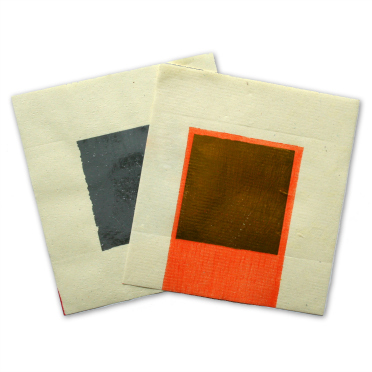
Chinese Joss Paper – Gold and Silver Foil
This is the most common kind of traditional joss paper, 5.5″ x 6″ sheets of bamboo paper decorated with a small gold or silver square in the center. Beautiful as is, or folded into the shape of gold ingots.
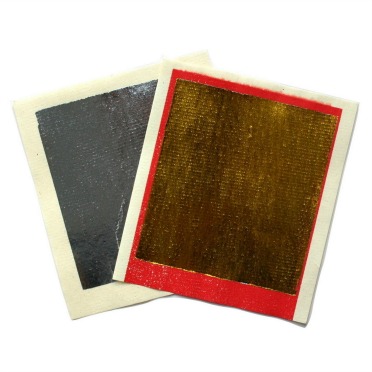
Chinese Joss Paper – Large Gold and Silver Foil
These sheets are identical in size to the squares above, but feature a larger rectangle of gold or silver foil in the center. There’s no meaningful difference between the two styles, choosing one over the other is just a matter of personal preference.
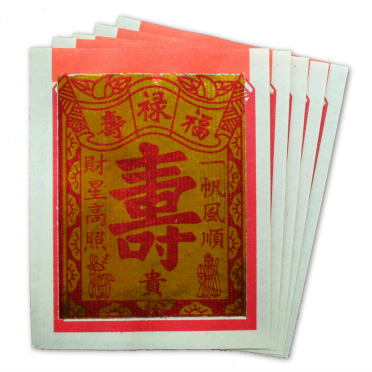
Chinese Joss Paper – Longevity
Each sheet is made from bamboo paper and decorated with a square of gold foil, the Chinese character for longevity and wishes for wisdom, smooth sailing and prosperity.
The Chinese joss paper “spirit money” known as Hell Bank Notes are commonly used in all manner of contemporary ancestor ceremonies. The most traditional notes bear the seal of the afterlife’s “Bank of Heaven and Earth,” while others are printed to resemble legal tender currency from various countries. Bills feature an image of the Jade Emperor, the Taoist monarch of heaven, and come in outrageous denominations from 10,000 to 1,000,000,000 dollars to help an ancestor purchase services, pay off the God of Death or escape punishment. Here are a few popular designs.
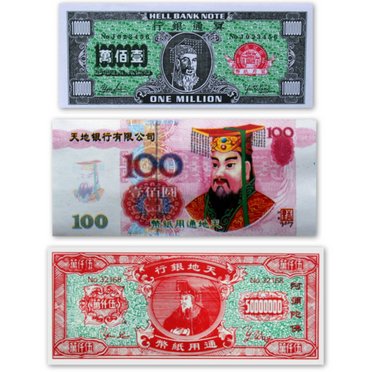
300 Piece Joss Paper Money Collection
This 300 piece collection is appropriate for funerals, ancestor birthdays and holidays like the Qingming Festival and the Hungry Ghost Festival. The set includes bills resembling the U.S. Dollar, the Chinese Yuan and the Bank of Heaven and Earth.
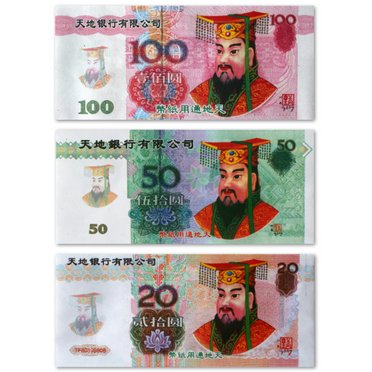
Joss Paper Money – Chinese Yuan
These Hell Bank Notes resemble the Chinese Yuan. Each bill comes in a 20, 50 or 100 Yuan denomination. Use these bills for family members who would be used to spending Chinese currency.
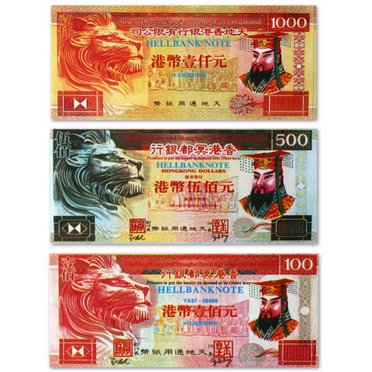
Joss Paper Money – Hong Kong Dollar
These Hell Bank Notes are printed to resemble the Hong Kong Dollar, each of the 3 included designs is decorated with an image of the Jade Emperor in a 100, 500 or 1000 dollar denomination.
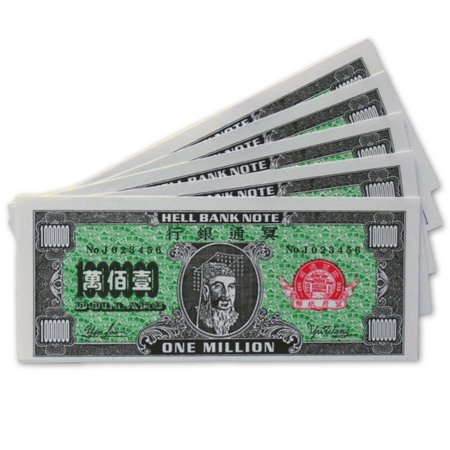
Joss Paper Money – U.S. Dollar
These Hell Bank Notes resemble the U.S Dollar. Each bill comes in a 1,000,000 dollar denomination with an image of the Jade Emperor. They’re a fitting way to memorialize family members who spent their lives in America.
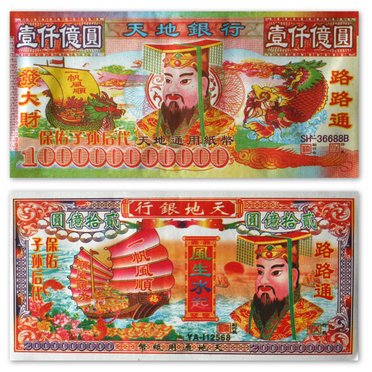
Joss Paper Money – Bank of Heaven and Earth
These XL size Hell Bank Notes are printed to resemble currency from the traditional “Bank of Heaven and Earth.” Each of the included designs is decorated with an image of the Jade Emperor and auspicious symbols like gold ingots, dragons and peonies.
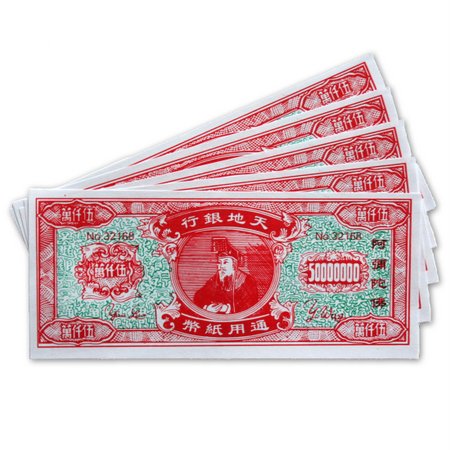
Joss Paper Money – Bank of Heaven and Earth
These Hell Bank Notes are printed to resemble currency from the traditional “Bank of Heaven and Earth.” Each sheet is decorated with an image of the Jade Emperor in a 50,000,000 dollar denomination.
Finally, joss paper crafts are burned to send ancestors the luxuries they lacked while living. Crafts are most commonly burned for specific relatives at funerals, on birthdays and death anniversaries and during the Qingming Festival. You’ll see joss paper houses, cars, servants, airplane tickets and flat-screen TVs. No extravagance is too large. Here are just a few examples.
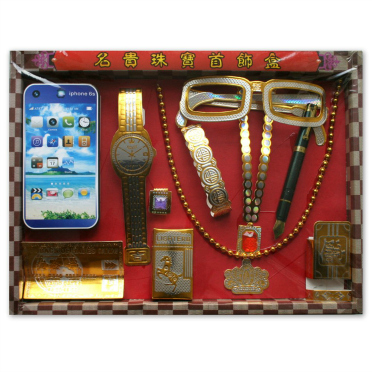
Joss Paper Crafts – Male
This box of essentials is designed to provide a male family member with everything needed in the afterlife, including a mobile phone, wallet, credit card, glasses, a watch, a lighter and belt.
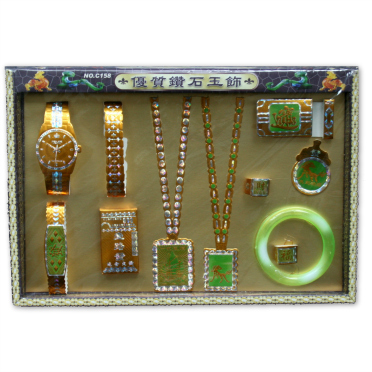
Joss Paper Crafts – Female
This box of essentials is designed to provide a female family member with everything needed in the afterlife, including a watch, jade bracelet, gold bracelet, lighter, necklace and ring.
Depending on your source, the earliest joss paper rituals date back more than a thousand years to when paper coins were burned to please the spirits. Burning joss paper at funerals became standard practice by the 12th century and the custom arrived in the United States with the first Chinese immigrants who arrived in California during the 19th century.
As you shop for joss paper, note that variations abound. Joss paper may be decorated with different seals, stamps, pieces of contrasting paper, engraved designs or other motifs. Different regions of the world have preferences for the type of joss paper that is used. For instance, Hell Bank Notes are commonly found in regions where Cantonese populations dominate, but are rarely seen or used in places such as Taiwan or Macau, which predominantly use bamboo paper sheets.
Why to Burn Joss Paper
Taking time to care for ancestors in the afterlife ultimately reflects the value the Chinese place on filial piety and respect for one’s elders and ancestors. Put in more contemporary terms, burning joss paper provides the opportunity to make space and take time to remember the loved ones in your life.
According to tradition, the Chinese believe that the deceased have needs similar to those in the natural world. Joss paper is burned at funerals and during important dates thereafter to help the deceased pay off debts, trade for goods and exist comfortably in the spirit world.
With this context, joss paper ingots and currency with denominations reaching into the billions serve an obvious purpose. More contemporary additions like joss paper clothing, shoes and lengths of fabric also seem practical. I’ll leave you to form your own opinions about joss paper iPads, sports cars and mansions complete with servants.
When to Burn Joss Paper
There are many occasions to burn joss paper throughout the year, and each instance carries a slightly different meaning and requirements. For some people, burning joss paper is a near-daily spiritual practice; for others, it’s something that’s done only during holidays and important family gatherings. Here’s how to decide what’s right for you.
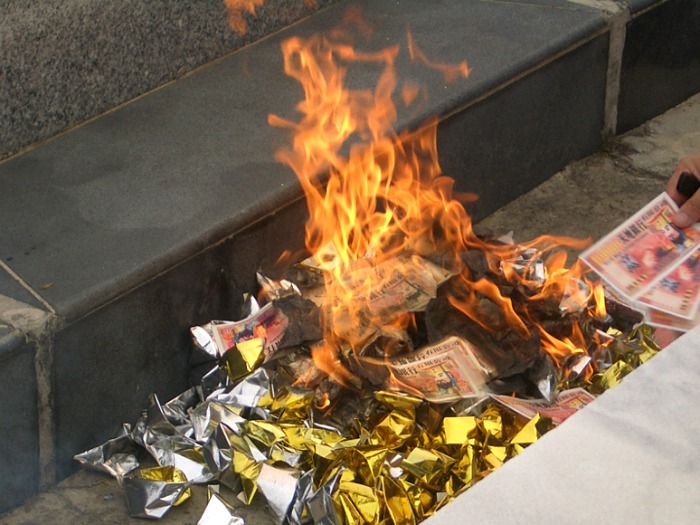
Funerals
The Chinese believe that it’s unlucky to arrive in the afterlife empty-handed or indebted. Consequently, burning joss paper is an essential part of Chinese funeral customs. Funeral offerings can be elaborate and typically include joss paper squares, lots of currency and household necessities like clothing, electronics and jewelry.
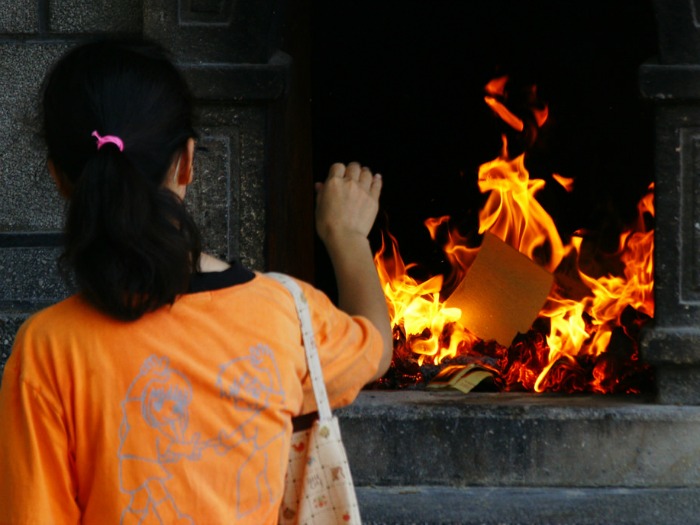
Ancestor Birthdays and Death Anniversaries
Recognizing the anniversary of a relative’s birth or passing is something like a family party for the deceased. You can prepare a relative’s favorite meal, exchange family stories and burn a small offering of joss paper money in remembrance.
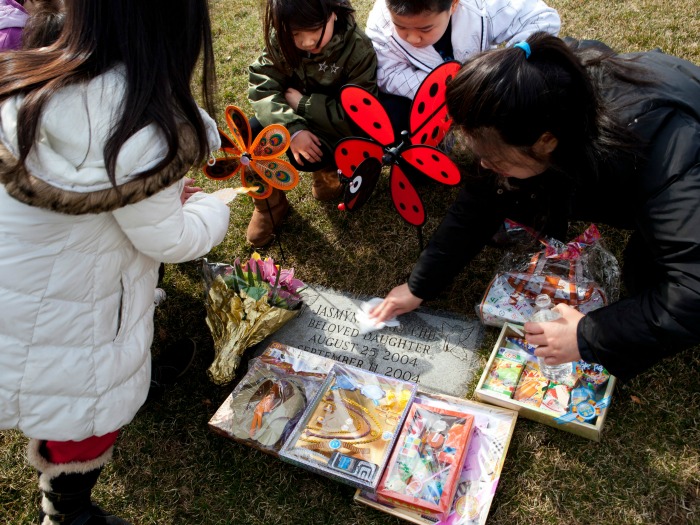
Qingming Festival
As part of a tomb sweeping ceremony, joss paper currency and personal craft items are burned to honor the deceased. Larger offerings are emphasized, as this is the primary opportunity during the year to remember a family’s ancestors.
Read More: How to Plan a Tomb Sweeping Ceremony »
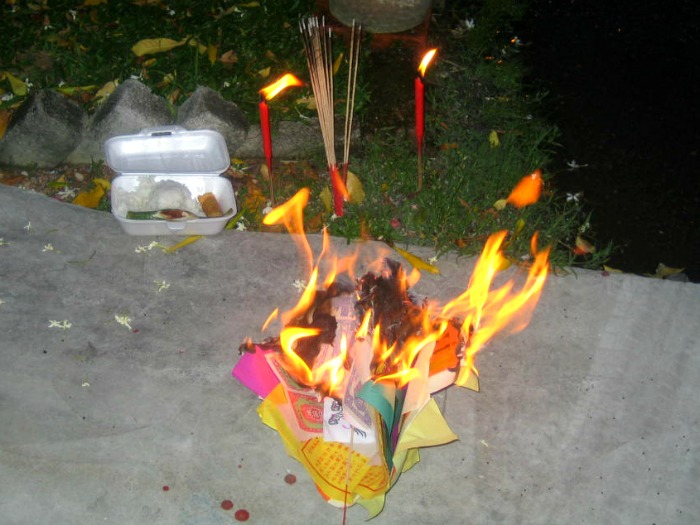
Hungry Ghost Festival
Joss paper offerings during the Hungry Ghost Festival are less elaborate because they are intended to appease wandering spirits without families to care for them. Setting a up makeshift altar at the curb outside your home with joss paper offerings and food for the ghosts is common.
Read More: How to Plan a Ghost-Feeding Ceremony »
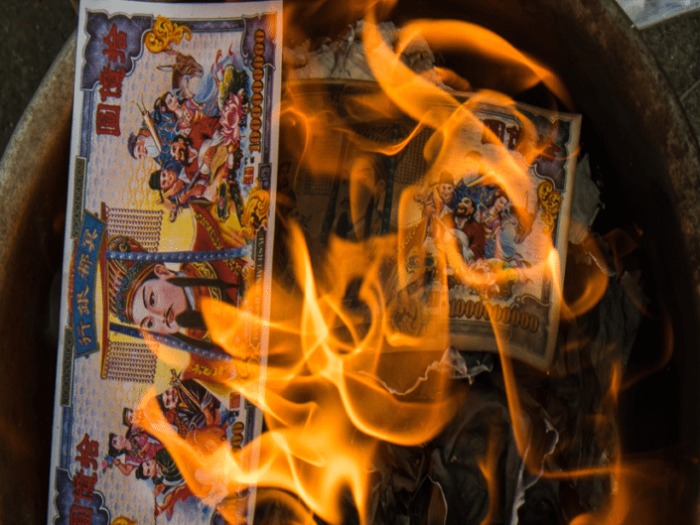
Daily Life
Many Chinese families keep a supply of joss paper at home to burn during moments in everyday life when a deceased relative is remembered. For instance, some people burn joss paper on the 1st and 15th of every lunar month, at family gatherings like a Chinese New Year dinner or even simply after thinking fondly of an ancestor during the day.
There are many different ways to incorporate the burning of joss paper into the rhythms of the year. For what it’s worth, we see the biggest sales of joss paper at the Chinese American Family shop in the 5th (prior to the Qingming Festival) and 7th (prior to the Hungry Ghost Festival) lunar months, as well as immediately prior to Chinese New Year.
How to Burn Joss Paper
There’s really no coherent theology behind the practice of burning joss paper — all you really need is the paper items, a pot or urn to burn them in and the time for reflection. The underlying belief is that burning changes the nature of the offering, allowing it to escape the natural world and reach ancestors, gods and ghosts in the spirit world.
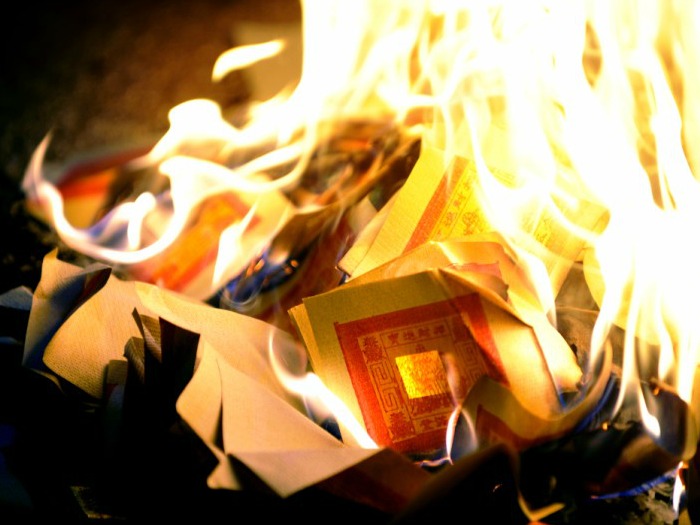
Joss paper burning is usually the last act performed in a Chinese ancestor worship ceremony. Joss paper squares may be burned as is, folded in half or stacked into elaborate pagodas or lotuses. People may write the names of loved ones on the back of the offering, before saying a quiet prayer while the item burns and the smoke rises into the air.
Read More: How to Fold Joss Paper Ingots »
As you prepare to burn joss paper, remember that the practice is meant as an expression of sincerity and a gesture that honors those who have come before us. The act respects, honors and cares for ancestors in the afterlife, guaranteeing their well-being and positive attitude toward the living.
There are a few superstitions to observe while burning joss paper. Joss paper is treated as real money for gods and ghosts — don’t casually throw joss paper onto the fire, step on joss paper and the burned ashes or throw away unused joss paper. Each of these acts shows disrespect to the very ghosts that we’re trying to please.
Joss Paper Practices Today
The growth of Christianity, the loss of language skills and the dispersal of the Chinese American community each threaten the practice of traditional cultural customs in the United States. Those who burn joss paper often do so in small, quiet ceremonies within their immediate families, resulting in less understanding of the practice across the broader community.
Consequently, it’s up to us in the 2nd generation to preserve and pass along joss paper customs to our children, many of whom have lived their entire lives in the United States and may not speak even a word of Chinese. Visit a joss paper store in Chinatown, spend time with grandma and then share why and how we burn joss paper with loved ones.
Your turn! Do you have any other questions about joss paper practices? I’d love to hear from you in the comments section below!
HT: Photos via BOSS, Wikimedia Commons, New York Times, Taoist Secret, Buk It Brown Experience, Cypress Lawn and Flickr.
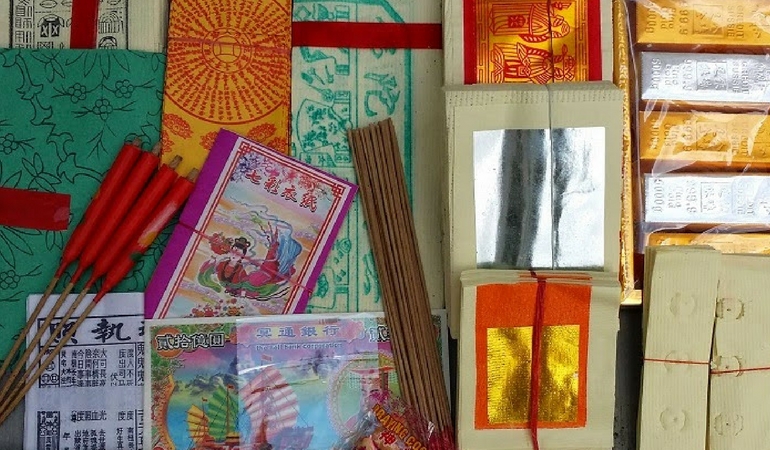



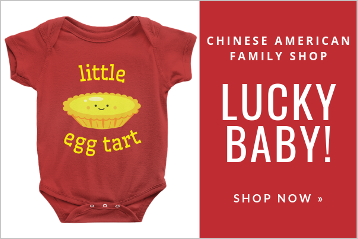


Annie
Thank you for your informative article. My father just passed away and I was not very familiar with the tradition of burning Joss paper items. I now have a better understanding . Thanks again for sharing this.
Wes Radez
I’m sorry for your loss, Annie, and glad that this article could help you in a time of need. ~Wes
Anna Dauz
what should I do to paper joss ashes
Wes Radez
Thanks for your question, Anna. The first tip, of course, is to observe basic fire safety — don’t burn joss paper near other flammable items, don’t leave ashes unattended, etc. From a traditional perspective, the primary superstition is not to step on joss paper ashes, which is considered disrespectful. Past that, you can dispose of joss paper ashes the same way you might get rid of spent coal or other burned items you’ve finished using. ~Wes
Natalie
Thank you for this insightful article! I plan on purchasing ancestry money for my mom who past 3 years ago. So just to be clear, does it matter where you purchase it and can you dispose of the ashes in a water source like a river ,lake or ocean or bury them?
Wes Radez
Hi Natalie, I’m not aware of any specific customs regarding the disposal of the ashes past observing basic fire safety. And, no, it shouldn’t matter where you purchase the joss paper. ~Wes
Jess
Hi Wes,
Thank you for your article. My grandmother passed away. We are not too familiar with protocol but felt that maybe afterwards there wasn’t enough joss paper burnt at her funeral. Can we burn more joss paper in the days after her funeral? Can we do it at home or have to go back to the burial site? Would appreciate your thoughts.
Wes Radez
Hi Jess, I’m sorry for your loss and I’m afraid I can’t provide a definitive answer. I would suggest calling either a Chinatown joss paper store or a cemetery with many Chinese funerals. For instance Cypress Lawn in Colma or Mountain View in Oakland here in the San Francisco area. I hope this helps you. ~Wes
cm
Can you burn joss paper for yourself?
Wes Radez
Hi CM, thanks for your question. The tradition is to burn joss paper for the deceased. ~Wes
CM
Thank you for your informative article.
Wes Radez
Quite welcome! ~Wes
Alice Coaxum
Thanks for sharing. This is really helpful as I’ll soon be setting up an ancestor altar and have been researching various customs and traditions regarding it. Is there a specific way you begin and end your ceremony when burning joss paper?
Wes Radez
Thanks for your question, Alice. Ceremony practices vary by individual and occasion — I would suggest visiting a Chinatown joss paper store or temple to ask for advice that applies to your specific situation. ~Wes
Cindy
Hi Wes,
Thank you for your article. I have a better understand about joss money. You’ve mentioned to burn during death anniversaries or even birthday. I understand that family gather together and burn joss money to the death anniversary. The date is set base on the lunar calendar. Do you know how do I find to select the good day? Thanks!
Wes Radez
Hi Cindy, I’m glad that the article helped you. The government of Hong Kong provides a really helpful set of tables to convert the Gregorian calendar to the Lunar calendar: http://www.hko.gov.hk/gts/time/conversion.htm. ~Wes
Donia Marie Desautels
Hi Wes, thank you so much for your informative article! My question is, is it appropriate to use joss paper in other ways? I am not Asian, and would not want to do anything culturally insensitive. I was wondering if I could use it to decorate the walls in my kitchen, as the paper is just gorgeous. Any feedback would be greatly appreciated!
Wes Radez
Hi Donia, thanks for writing! Traditionally, the answer would be no, as joss paper has a specific intended use. That said, we’re in a moment when many elements of the culture are being reimagined for contemporary times — for instance, some people don’t burn joss paper anymore for environmental reasons. I’d invite anyone else in the community here to weigh in with an opinion, but would suggest that if you use these ceremonial papers for alternate purposes like crafting or decorating that you proceed lightly and thoughtfully, with appreciation for their cultural purpose. ~Wes
T. Maiden
Can you provide a web address or regular mail address of a shop that sells the various types of Joss paper heaven or hell banknotes? Please let me know, thanks!
Wes Radez
Hi T! Yes — you can find these products in our Chinese American Family shop. Here’s the link. ~Wes
Philip Kearney
What are the small red candles or fire sticks?
I am enjoying your articles very much. I am a Caucasian married to a Chinese man.
Wes Radez
Thanks for your question, Philip. Incense sticks and red candles are both used as offerings for the dead during the Qingming Festival and Hungry Ghost Festival. ~Wes
sandra j
Very informative article. Thank you! My mom passed 3 months ago and today is her birthday. I’m going to burn some for her.
Wes Radez
I’m sorry for your loss, Sandra, and happy that the article could help you. ~Wes
E Macinnis
I understand that there is a kind of joss paper called the Honorable Men – or Honorable People paper, red and green with small holes. Do you know where I could buy this?
Wes Radez
Thanks for your question, E. I’d have to refer you to a joss paper store in Chinatown to find that item. ~Wes
TS
Do you know where people can have the “stove” to burn joss paper in Vancouver? Or any temple can do the job for a toll?
Wes Radez
Hi TS, I’m sorry that I can’t connect you with a resource in the Vancouver community. ~Wes
Megan
I’m fascinated by joss paper but have never seen one thing addressed. Can joss paper be made at home? For example, if a child drew a gift for a deceased family member and it was burned, would that be acknowledged and counted as a real offering? Or is there specific symbolism and process that happens when storebought joss paper is made?
Wes Radez
Hi Megan, burning joss paper is a spiritual practice. My opinion — store bought joss paper carries certain specific cultural significance, but the practice you’re suggesting, which connects a child with a deceased family member, is a beautiful idea. ~Wes
Dawei
Hi Wes,
Does it matter how much joss paper one burns? At my local Chinatown store joss paper is sold in little bundles of 25 notes. Yet I have seen people burning entire cases of joss paper at a Buddhist temple in Taiwan.
Also, some joss paper resembles closely to American currency. Any issues or concerns of counterfeiting that you are aware of? In other words, has some joss paper been ceased by law enforcement for looking like cash? Thanks
Wes Radez
Hi Dawei, I’m not aware of any counterfeiting concerns. Even joss paper that resembles currency seems to feel more like play money than anything closer to the real thing. In terms of how much joss paper to burn, the general rule is more > less, roughly scaled to the importance of the event, holiday or commemoration. ~Wes
Mingie
I have folded joss paper all my life. I was always told to never fold after sunset. Do you know why?
Wes Radez
Hi Mingie, I’m not familiar with that specific rule myself, but could imagine it being related to some of the superstitions associated with the Hungry Ghost Festival (not being out after dark, etc). ~Wes
Daniella
Hi. I have a question. I am not Chinese. Would it be disrespectful if I were to purchase joss paper to burn for my brother, he passed away close to 3 years ago.
Wes Radez
Hi Daniella, no, in terms of adopting cross-cultural practices, I don’t think it’s disrespectful as long as the intent and origin of the practice are honored. Basically, as long as you understand what you’re doing and why, then I think it’s a wonderful idea. ~Wes
Susie
I am biracial American, my father was Chinese and my mother Puerto Rican. I have just purchased several All – You – Can – Eat Manhattan CHINATOWN NYC Maps. Included in the map package is a $10,000 Joss Paper heaven bank note. My plan is to gift these maps to guests at a Chinese New Year dinner I am hosting in a Chinese restaurant. The guests are non Chinese or mixed race like myself.
When I was in my early 20’s, I hosted another Chinese New Year dinner in a NYC Chinatown restaurant. My father had just passed and I wanted to keep up traditions in his honor with my family. All I truly knew about the Chinese New Year was we had these incredible meals cooked by my father and we all received red envelopes filled with cash. I went to the corner store, picked up some red envelopes and grabbed some joss paper notes I saw in passing. I thought it would be funny, even hopeful. More uplifting than the crisp but sad $5 bills I had on hand.
After we opened the envelopes I was badly scolded by the restaurant manager, we were told the notes were for funerals and it would bring bad luck to all present. He went on, however I only recall the shame and humiliation.
That said, what’s up with the note included with the map? Is it inappropriate? Is it bad luck? Should I remove the note from the packages before I gift them at a restaurant filled with real Chinese? I don’t see any explanation/definition for the note on the map or its package. I know the map is not your product.
Given these notes are often sold in shops frequented by tourists and others not acquainted with the history and proper or rather improper usage. Might some educational signage be appropriate where your product is sold.
Wes Radez
Hi Susie, thanks for sharing your loving memory of your father. I’m sorry for your experience at the restaurant — the manager was correct in a strict cultural sense, but gosh I wish he could have been more tactful. That sounds terribly hurtful. In addressing your current question, I can’t think of a good reason you found a joss paper note among these maps. I would certainly remove the notes from the the packaging before gifting them. Have fun at your New Year dinner! ~Wes
Wanda
I would like to know what if the ashes get full in the pot. Do I throw them out or keep burning the money? How do I set up an altar at home? I would like to burn for my deceased relatives. This is is all new to me.
Wes Radez
Thanks for your questions, Wanda. It sounds like I need to write a post on these subjects. ~Wes
Tisha
I recently started burning Joss paper. It feels good to me to know that I can do something for those who have transitioned before me. However, now I have all these ashes and don’t know how to respectfully or culturally discard of them. What should I do with my Joss paper ashes?
Wes Radez
Hi Tisha, the ashes can be thrown away. Just don’t step on the ashes, which is considered disrespectful. ~Wes
Lauren
Got to say I love your content! I run my own online joss paper store based in Singapore (gotkimzua.com). Our practices are rather similar here as well! I’d love to share some of your posts in mine, would that be ok? 🙂
Wes Radez
Hi Lauren, nice to meet you across the ocean! Yes, I’m happy to have you share my content, please just provide attribution and link over to the original post here at Chinese American Family! ~Wes
Lou Ella
This was very interesting and comprehensive, thank you. We are fortunate to be visiting Hong Kong and look forward to seeing the amazing paper offerings for sale in Sheung Wan. We have no Chinese heritage and I would therefore like to ask if it would be inappropriate to keep these types of offerings as souvenirs? They would be kept respectfully but, since this isn’t their intended purpose, would it be considered disrespectful or bad luck?
Wes Radez
Hi Lou Ella, thanks for your question and I’m happy to hear you’ll be visiting HK! This is a tricky one. It feels a bit like when I’m asked whether joss paper can be used for decorations or craft projects. If it were me, I wouldn’t keep offerings as souvenirs, as it’s not the intended purpose, as you note. Perhaps take a picture from a respectful distance to help a memory endure. Enjoy your trip! ~Wes
Erudite_Birdy
Thanks for taking the time to write this article. I found it really helpful and I loved the images.
I shared a bit of this in the comment section for the Chinese novel “Emperor’s Domination”, as the readers had no idea why the characters were burning money and other symbolic items.
It’s free to read on wuxiaworld.com/novel/emperors-domination
Wes Radez
Wonderful, I’m glad that the information is helpful to your readers! ~Wes
mik
Who does the most burning of joss paper, the Cantonese? Can you burn them in an incense urn?
Wes Radez
Thanks for your questions, Mik. I don’t think any particular group of Chinese burn more joss paper than another. And yes, you can burn the joss paper in any appropriate vessel. ~Wes
Ben
Hi Wes,
I cannot seem to find the blank, 5 or 7 colors thin joss paper near where I live in the U.S., and haven’t found an online shop that offers it so far. Would you happen to know any websites that do sell this variation? I’ve searched Amazon and eBay but no luck there. Thanks for any info/suggestions! -Ben
Wes Radez
Thanks for writing, Ben. I’m having trouble visualizing what you’re describing. Do you have a picture you can send? If so, you can email it over to me and I’ll take a look. ~Wes
Nick Tam
Wow, this is most definitely an insightful and amazing article! It’s great to see other fellow american/canadian chinese carry on the tradition, as well share our cultural values!
Keep up the great articles, you deserve all the positive comments and support you;ve received so far! It was a great article, as I rarely comment on posts, but you most definitely deserve the support and recognition for this one!
Wes Radez
Thanks for your kind words, Nick. Hope you enjoy exploring the rest of the site! ~Wes
Laurina Yu
Thank you for your informative article. My mother passed away a year ago, and I would love to burn more joss paper for her during her birthday or death anniversary. I’ve seen pictures of joss paper crafts online, like clothing, shoes, purses, snacks. We don’t have a Chinatown where I live, and I’m almost 8 hours away from San Francisco. Do you know of any online sites that sells joss paper crafts? I’ve searched through Amazon, but haven’t found anything.
Wes Radez
Hi Laurina, I’d like to help you out. If you’d please email me through the Contact page with a bit more information about the specific items you’re seeking, I’ll try to track them down for you here in the Bay Area. ~Wes
Janice Hsu
Thank you for this article. My mom passed away in 2018. We burnt some joss money at her funeral, but were at a loss as to how much and how often we should burn it. Understand it’s to help them in the after life, but do they stay in this after world forever or do they move on and are they reincarnated? I guess as an ABC, I really don’t know these things. I do know my mom would burn joss money throughout the year, but she never really explained why she would do it and if it was for any special occasion. Also, does it matter which joss paper is purchased? I’ve seen HK$, Yuan, US$ versions. Our mom lived in the US so I have burnt US$ joss money. Thank you!
Wes Radez
Hi Janice, thanks for your question. Specific practices vary by region and ethnic group, then are further adapted at the family level! Think expanding concentric circles — I would start by asking within your family for advice, then at joss paper shops in your local Chinatown, then by looking for Joss Paper (insert city or region, Singapore, etc), if you want to trace a practice back to a certain home region. ~Wes
Janice
Thanks, Wes. I purchased a random amount of joss money for various currencies as well as the gold/silver ingot paper. We burnt this at her grave site as well as some incense. For your readers, we did see others at the cemetery provide gifts and incense to their loved one’s neighbors and the use of very large incense sticks, which I will do next time. Unfortunately, most of my mom’s family has passed and the remaining are Christian and do not burn incense/joss money for ancestors and I cannot ask. I guess we’ll just do what feels right and hope for the best. But the gifts/flowers, incense and food for the neighboring plots is definitely something I had not thought of prior to my visit. I did see this done for the graves of all types of cultures – Latino and Asian – where the dead are remembered and honored more regularly.
Also the joss paper shops are Cantonese speaking which I do not speak.
Thanks again!
Wes Radez
Thank you for sharing your experience, Janice! ~Wes
Susan
Hi Wes, My mom passed away due to covid19 and we’re trying to do right by her with a proper send off in this challenging time. She is into Taoism and ABC children have no understanding the funeral process. This is how I access your for informative info on joss papers. May I suggest you provide an guide on Chinese funeral such as the 49days ritual, what are required and when. I think it will help others in the future. Thanks for sharing.
Wes Radez
I’m so sorry for your loss, Susan, and thank you for your suggestion. I will look into this possibility. ~Wes
Mark
Hi Wes. I’m in Australia and was interested in the Asian / Chinese burning ceremonies from conversations with a Taiwanese co-worker. I enjoyed reading your article – very informative. I have been to Bali and other areas where people follow the burning ceremony tradition. I think it is a beautiful way to honor those who have passed. In looking around for info, I also found an app for the ceremony. I thought the app was an interesting approach to the ceremony because there’s no air pollution! I see your family business sells joss paper, and I don’t want to take away from your business, but I thought some people who might be a bit environmentally careful might be interested in the app. It’s called “Joss Burn”. I got it on the Apple app store. I’m an Apple smart device user, but I’m guessing it might also be available on the Google store, too. It’s cheap & pretty easy to use. Hope this is helpful to some of your followers.
Thanks again for the great article.
Wes Radez
Thanks for that suggestion, Mark. Really happy to hear about your cultural exploration and appreciate you contributing a new idea to the conversation. ~Wes
Tiff
Hi Wes,
I’m very fascinating with the Joss papers. There are so many different kinds of Joss papers sold at the Asian grocery stores. Is there a way to know which kind is for which deities and ancestors, which package is for which holiday and for what intent purpose ? I can’t read Chinese so that’s why it’s hard to figure out what is said in the package. I asked the workers at the Grocery for help, but none of them known much about it either. If you have any info or can direct me to know where to find the info. I appreciate it. I really want to keep the tradition/knowledge going for myself.
Wes Radez
Hi Tiff, I would suggest visiting a specialty joss paper store, where you’ll find more specific expertise among the staff. ~Wes
Kat
This is very neat thank you. Someone left a large amount of US Bank Note Joss Papers under a Christmas Tree display my work had set up at a Canadian Hospital. Everyone thought they were counterfeit but there was something that was pulling me that it was something different. A little googling and I realized what they were and fell down the rabbit hole of Hell Money and the Customs of Joss paper. From my Pagan heart this speaks to my spiritual side so much, as my alters and items left out for my passed loved ones is similar. Unfortunately I don’t know the intent of the person who left them and most of my coworkers tossed the papers out. But what I managed to keep I will take and burn with intent that it goes to whomever it was meant for or needs it on the other side. Cheers.
Wes Radez
Glad that your experience led you down a path of discovery, Kat, and that you ended up at my site. ~Wes
Keira
Hello Wes, Thank you so much for this article, it’s really helpful. I came across Joss paper at Pearl River Market in NYC, and all I knew about it was that it was used in funerals sometimes. I’m wondering if it is disrespectful to use Joss Paper for an art project? Sorry if even asking that is disrespectful. I wonder if I end up burning the paper if that would end up being okay traditionally? I do want to share that I’m not Chinese (though I studied Mandarin for a while and very much enjoy learning about the different Taoist traditions). Thank you for your perspective and guidance.
Wes Radez
Thanks for your question, Keira. You’ll find an answer further up the comment thread. ~Wes
Kayleigh
Such a wonderful and interesting article I am so glad I came across your page. My fiancé is taiwanese and so I really wanted to lean more about the culture so we can share these experiences together,so it’s great to have a deeper understanding and can’t wait to read more of your articles. Hope you have happiness for the coming new year.
Wes Radez
Thanks very much, Kayleigh. Same to you! ~Wes
rick
We just bought a house and my Chinese (Guilin) wife said we need to enter the house “with fire”. She can’t explain it further. Does she mean incense? Burning a joss paper house? Stepping over burning coals as we enter? Any ideas how I can do this for her?
Wes Radez
Rick, this is my regular reminder that I need to write a post about Chinese housewarming practices. Hopefully soon! ~Wes